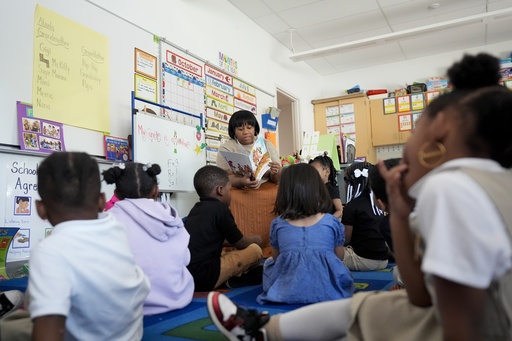
BALTIMORE — Davontez Johnson, a 19-year-old, has found himself in an unexpected role as a preschool instructor at Dorothy I. Heights Elementary after graduating as a senior from a nearby high school. Like many individuals his age, Johnson was uncertain about his future, never imaging himself in front of a classroom filled with energetic 4-year-olds, leading them in a rhythmic chant about phonics on a bright, colorful carpet.
“Words have parts — that’s syl-a-bles,” he articulated clearly, while the children looked up, their eyes wide with excitement, and repeated after him, “Clap your hands now, syl-a-bles! Stomp your feet now, syl-a-bles!”
Johnson is a participant in the Leading Men Fellowship, an initiative designed to prepare young Black and Latino men to become literacy teachers in preschool settings across the nation. This program is addressing multiple challenges simultaneously: not only is it working to alleviate the scarcity of early educators, but it is also focused on increasing the representation of Black and Latino men in teaching, while addressing the unique hurdles boys of color encounter due to their race and gender.
“We’re creating positive changes in the classroom for these young learners and simultaneously nurturing these prospective educators,” stated Ivan Douglas from the Literacy Lab, which oversees the Leading Men Fellowship.
Many fellows, including Johnson, are often recruited right out of high school. Following a rigorous interview process and a demanding summer training program, they begin their teaching roles in schools where male educators are a rarity. These fellows earn between $16.50 and $18 per hour.
As a former offensive lineman in high school, Johnson is aware that some parents might think he seems out of place in a preschool environment. Federal statistics confirm this notion, revealing that less than 1% of elementary and early education teachers are Black men. Nevertheless, this reality was part of what motivated Johnson to embrace the role.
“I saw it as a fantastic opportunity. If I had seen a teacher like me back in pre-K, I’d have been thrilled,” Johnson shared. “It’s uncommon to find young Black males in these positions.”
Research shows that Black male students often experience discrimination even before entering kindergarten, facing higher rates of exclusion from preschool compared to their white counterparts, despite evidence indicating similar behavior levels. Furthermore, boys in general are expelled at much higher rates than girls.
However, numerous studies suggest that having Black male teachers could lead to considerable improvements for Black students, particularly Black boys. Since its inception in 2016, the Leading Men Fellowship has shown that students of color tend to perform better academically when instructed by teachers who share their racial background.
Economist Nicholas Papageorge from Johns Hopkins University examines the impact Black educators have on Black students. His studies reveal that Black teachers maintain higher expectations for their Black students than non-Black teachers do.
“If a Black student was assigned both a Black teacher and a white teacher, the white teacher often held systematically lower expectations,” Papageorge explained. His subsequent research indicated that Black students with Black teachers are less prone to drop out of high school and more likely to pursue college education, with the most pronounced effects seen among Black boys from low-income families.
Throughout his training, Johnson has grasped the complexities of early education, which surprisingly incorporates a lot of singing and dancing—an experience more akin to a stage performance than traditional teaching. Children absorb information better through repetition, particularly when paired with movement and music.
Bridget Jeffrys, who oversees Johnson’s classroom, noted that she had never had the opportunity to collaborate with a male educator prior to his arrival at the beginning of the last school year. She observed a transformation in Johnson as he gained confidence and enthusiasm with the children. Although she joked that his singing and dancing might need improvement, she emphasized that his passion and genuine connection with the students made all the difference.
“It was wonderful to see him relate to the kids; it’s uncommon to find men engaging at their level,” Jeffrys remarked, adding that many of the preschoolers considered Johnson akin to a big kid themselves.
In addition to teaching at Heights Elementary, Johnson is pursuing a degree in political science at the University of Maryland Global Campus, harboring ambitions of entering the political arena. Yet, many of his coworkers are encouraging him to continue in education.
While Johnson’s primary role involves focused literacy instruction, he has seamlessly integrated into the daily activities at school. In just his second week in the classroom, he entertained students with a robot voice while singing their morning greeting. When a child began to fidget or wander off during story time, Johnson was quick to guide them back.
On a particular October day, Johnson assisted students with writing their names and quickly became a favorite among many. During playtime, he attentively encouraged a girl working on a crayon rubbing of a leaf, praising her efforts and providing validation.
“Great job!” he remarked, eliciting a bright smile from the girl who looked up at him for affirmation. Meanwhile, another child approached him, eager to share a handful of toy money.
After lunch, as the children listened intently to a story read aloud by Jeffrys, 4-year-old Kodi Hendricks wandered towards the door. Johnson gently called him back and knelt down to tie the boy’s shoelaces, before they both settled in for a lesson in penmanship.
“What’s the first letter?” Johnson inquired.
“K,” the boy answered tentatively. Johnson demonstrated how to draw the letter K in a slow and patient manner.
“I can’t do it,” the boy replied, visibly unsure.
“That’s alright,” Johnson reassured him, “You can do it. It just requires a bit of practice.”
